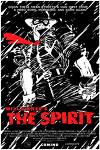The Spirit

I knew this was coming ever since I first saw the commercial for it WAY back in like March (or somewhere around there). The Spirit has shown us that Frank Miller writes damn fine comics and little else.
|
|
This is the original Spirit by Will Eisner. |
|
|
This is the Miller version. |
|
|
This is the movie version. |
Which version do you think most closely resembles the movie? |
|
It was originally titled Will Eisner’s The Spirit, but has been abbreviated to just The Spirit for obvious reasons: this version has very little to do with Will Eisner. Much like Miller’s Daredevil run in the 80s, this is just a sounding board for Miller’s idea that everything should be a crime novel (sometimes it works. It worked for Daredevil, it worked for Batman, it worked – to a lesser extent – with Ronin and Wolverine. It did not work with Spawn or Robocop or most of the Sin City trades). It looks almost exactly like Miller’s Sin City comics – one color (sometimes two), stark contrasts, all the women look exactly the same, etc.; it has same silhouettes, the same odd on-again, off-again super-powers, and the hero even wears the same shoes as his Sin City counterparts. It looks nothing like Eisner’s original (in every sense of the word) four-color creation: an everyman who somehow saves that day time and again.
To be honest, I really enjoy both Eisner and Miller comics. I think, for their respective times, each had a unique outlook that ushered in the next wave of creativity that would eventually dwindle – like all things do in the comic business – into mediocrity: Eisner with The Spirit, Miller with Daredevil; Eisner with A Contract with God, Miller with The Dark Knight. It’s for this reason that I picked up the two-day conversation Eisner/Miller from Dark Horse Books. In it, Eisner talks about how he would never want any of his creations brought to a movie format because he believed people would screw it up. Most of his conversation with Miller circles around the fact that Eisner enjoys the intimacy of a comic page, where a movie has to be completed with hundreds of people making individual sacrifices and compromises about the core idea. As a matter of fact, he seems to abhor Hollywood, “Comics artists do what comes first… Movies adapt, they’re not creative. They [Hollywood] take a comic book and adapt it to film.” He even asks Miller at one point if he would like to see Sin City made into a movie: “You just said it. Too precious. I like that. It’s precious to you. You don’t want to see [Sin City] warped into a movie.” Miller then goes on to talk about the technology currently being developed that might make a comic book better looking on screen. It’s obvious from reading this that Miller intended to go ahead with the Sin City movie. After seeing The Spirit, it’s also obvious that he believes any comic can be adapted to a movie, given the right director and/or crime-based drama. Or maybe he really did misread his friend’s wishes and thought Eisner would love a Sin City comic called The Spirit.
One big mistake that Miller makes is the number of “subtle homages” he makes to other comics. It’s what killed the latest Hulk movie. The Spirit is filled with these comic book “winks.” A character says “the hard goodbye” (a Sin City reference) for no apparent reason. Another character says “ten minutes of a man’s life” (a Spirit reference) with the same motivation. At one point we see an EC comic, in another part we see “Ditko’s Speedy Delivery.” There’s a character named Donenfeld and another named Liebowitz, both of whom are DC Comics founders. It wouldn’t be so bad if they were simply inserted naturally (I remember the phrase “the east side of Lairdman Island” from the original Teenage Mutant Ninja Turtles movie) but they weren’t. They were horribly forced. Much like my wife was when I told her what we were going to the movies to see.

I could go on. I could talk about how I wasn’t sure if certain parts were supposed to be funny or if I was just laughing because they were bad; I could talk about how Miller seemed to want to try and capture the fun of Burton’s Batman; I could even talk about how The Spirit somehow takes the worst aspects of Batman & Robin, Dick Tracy, The Rocketeer, and The Shadow, but I won’t. I think the movie can best be summed up in one scene (after which, I asked The Wife if she wanted to sneak out and go see The Curious Case of Benjamin Button. The way I figure it, I paid for two hours of seat time, but – bless her heart – she said she thought she’d be cheating the theater if she were to attend a movie that she didn’t pay for): Frank Miller plays a cop buddy of the Spirit. He gets beheaded by the Octopus and the Octopus proceeds to beat the Spirit with the head of Frank Miller.
I think that one scene says everything that I cannot.



Leave a comment